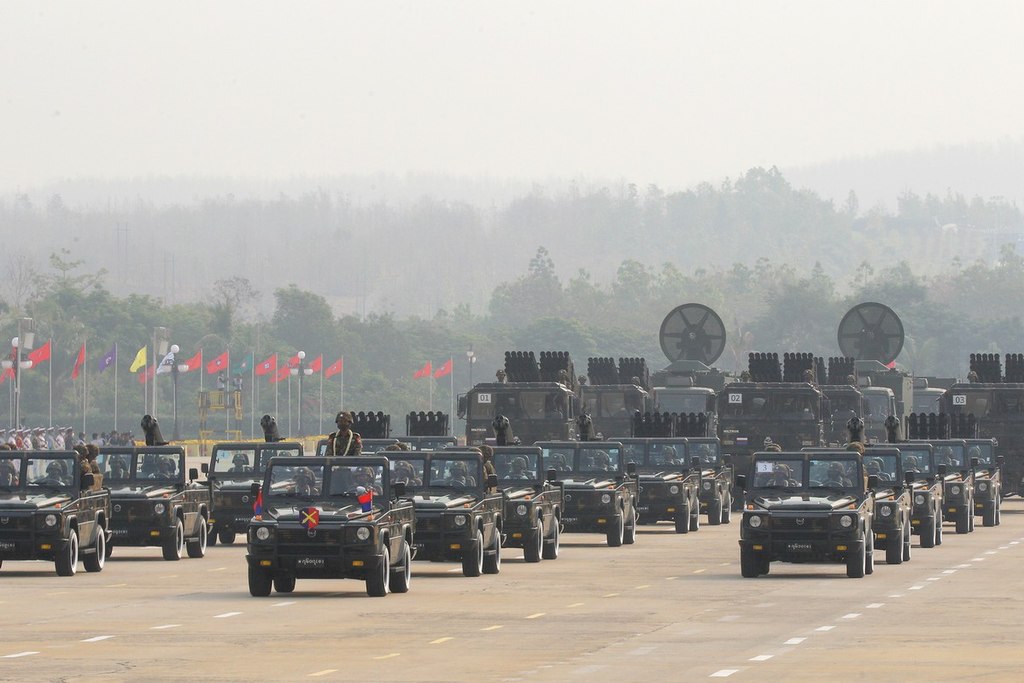Myanmar’s military junta buying weapons through Thai banks
Until last year, financial transactions were mainly facilitated by institutions in China and Singapore. Between April 2023 and March 2024, Myanmar bought US$ 253 million worth of weapons, a third less than the previous year, but much remains to be done over sanctions, UN Special Rapporteur on human rights said. Meanwhile, former President Thein Sein visits China.
Yangon (AsiaNews) – Foreign banks continue to facilitate arms purchases by Myanmar’s military junta, and the most active are Thai banks, this according to the latest report by Tom Andrews, UN Special Rapporteur on human rights in Myanmar.
“By relying on financial institutions that are willing to do business with Myanmar state-owned banks under its control, the junta has ready access to the financial services it needs to carry out systematic human rights violations, including aerial attacks on civilians,” which “have increased five-fold,” the UN official said.
Myanmar has been ravaged by civil war for more than three years, pitting the military, which seized power in a coup d'état in February 2021, against resistance groups, but also the civilian population, targeted by the air force.
According to the report, titled Banking on the Death Trade: How Banks and Governments Enable the Military Junta in Myanmar,” 16 banks in seven countries processed transactions in favour of the junta, formally known as the State Administration Council (SAC), between April 2023 and March 2024.
During this period, SAC spent US$ 253 million on armaments, a comparatively good thing, since the volume of military procurement through foreign banks dropped by a third (from US$ 377 million), due to a decline in exports from Singapore, following an extensive government probe.
Until a few months ago, Singaporean banks were “the most important financial facilitators for Myanmar's military procurement,” with US$ 110 million in transactions, along with China and Hong Kong, which in fiscal 2022 recorded sales of US$ 140 million, compared to US$ 80 million the following year.
Purchases from Russia went from US$ 25 million to US$ 10 million, while those from India remained stable at US$ 15 million.
Thailand is now the leader, its banks facilitating military purchases of US$ 60 million in 2022, and US$ 120 million in 2023.
“The good news is that the junta is increasingly isolated,” the report says. “The bad news is that the junta is circumventing sanctions and other measures by exploiting gaps in sanctions regimes, shifting financial institutions, and taking advantage of the failure of Member States to fully coordinate and enforce actions.”
Thailand's Siam Commercial Bank (SCB) alone processed more than US$ 100 million in transactions in 2023, up from just over US$ 5 million a year earlier.
Yesterday, in a statement, Thailand’s Ministry of Foreign Affairs (which has tried to help end the war. proposing aid to Myanmar) said it had read the report.
“Our banking and financial institutions follow banking protocols as any major financial hub. So we will have to first establish the facts before considering any further steps,” a ministry spokesperson explained.
The SCB denied the allegations, saying an internal investigation determined that its transactions with Myanmar were not linked to the arms trade.
However, according to Andrews, international banks need to know that there is a "high likelihood" that transactions involving Myanmar state entities, like the Myanma Foreign Trade Bank, might entail purchases of weapons or materials for war use.
Loopholes in sanctions (imposed individually by some countries but not by the UN) mean that SAC can buy aviation fuel, the report goes on to say.
Analyst David Scott Mathieson argues that new sanctions only on fuel may not be enough "to make a real impact," because the military “are able to access raw materials” and can “make bullets, weapons, landmines” to “keep fighting for quite some time.”
Once again, the end of the war seems far away. Former pro-reform President Thein Sein, who led the country from 2011 to 2016 before the rule of pro-democracy leader Aung San Suu Kyi, flew to China yesterday, the Chinese embassy in Yangon said in a statement.
Thein Sein met China’s ambassador and the two discussed “the situation in Myanmar and cooperation between the two countries.”
Although China has supplied weapons to Myanmar’s military regime, ties with the junta deteriorated last year after the military failed to dismantle online scam centres on the border, involving thousands of Chinese nationals.
24/03/2023 13:21
26/05/2022 19:43
12/01/2024 19:26







.png)










